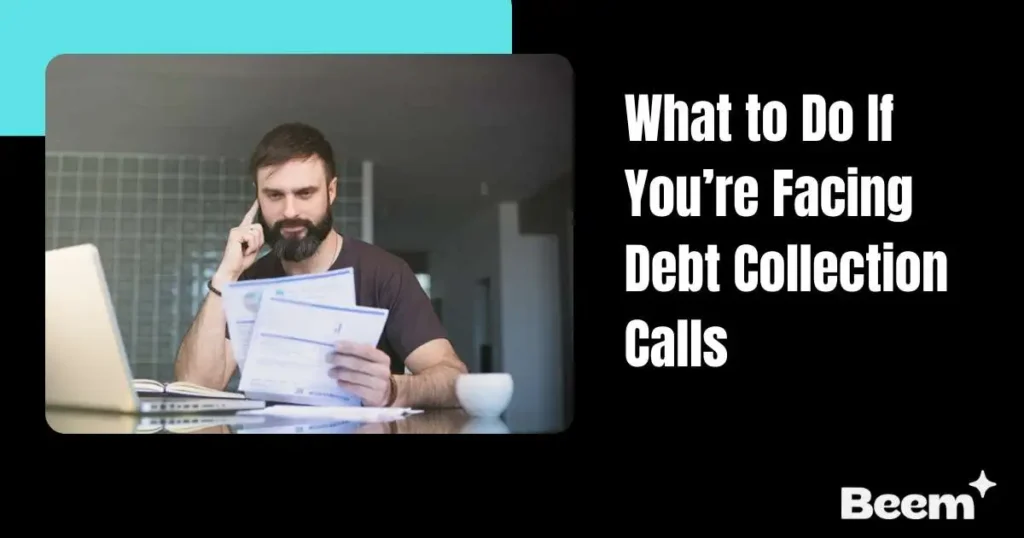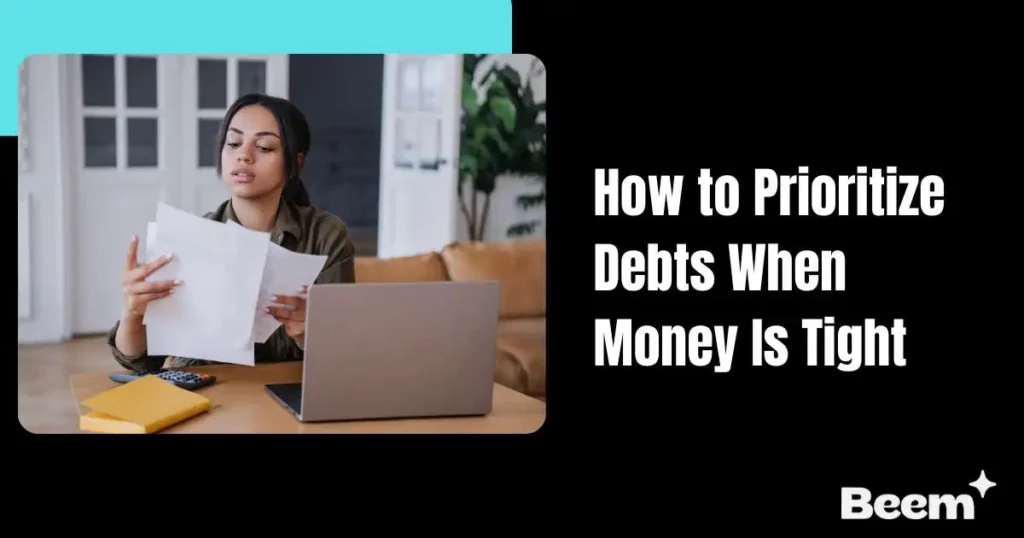What You Will Get At Glance
Debt collection calls are never easy to handle. They often come at the worst times, bringing feelings of stress, shame, and uncertainty. When you’re already dealing with financial difficulties, the constant barrage of calls from creditors can feel overwhelming and out of control. You may fear legal consequences, feel guilty about the situation, or not know your options. But here’s the reality — you don’t have to face these calls alone and don’t have to panic.
The good news is that there are steps you can take to manage debt collection calls without sacrificing your peace of mind. Whether you’re behind on a credit card, personal loan, or medical bill, knowing your rights and having a plan can turn the situation from distress to control.
This blog will explore what to do when facing debt collection calls. We’ll help you understand your rights, how to handle the calls, and what steps you can take to manage your debt effectively. And most importantly, we’ll guide you toward solutions, including debt consolidation, personal loans, and tools to protect your credit through apps like Beem. Let’s dive in.
Understanding Debt Collection: The Process and Your Rights
Debt collection is a legal process used by creditors to recover money owed to them. When a borrower falls behind on payments, the lender may turn over the account to a debt collection agency to recover the outstanding balance.
While debt collection is a standard process, it’s essential to understand your rights and the rules governing debt collection calls. The Fair Debt Collection Practices Act (FDCPA) protects consumers from harassment by debt collectors, ensuring they follow specific guidelines when collecting debt. These rules are meant to prevent harassment, abuse, and deceptive practices.
Key Rights Under the FDCPA:
- No Harassment: Debt collectors cannot harass you or use abusive language. Threats of violence or public humiliation are prohibited.
- Right to Dispute: You have the right to dispute the debt within 30 days of receiving the notice from the collector. They must cease collection efforts until the dispute is resolved.
- Time and Place Restrictions: Collectors cannot call you at inconvenient times (e.g., before 8 AM or after 9 PM) or contact you at work if you’ve asked them not to.
- Request for Written Validation: If you’re unsure about the debt, you can request written proof from the collector showing that you owe the money.
These rights protect you from being overwhelmed and unfairly treated by debt collectors. Understanding them can alleviate much of the stress that comes with the situation.
What to Do When You Get a Debt Collection Call
1. Stay Calm and Professional
It’s natural to feel anxious when you pick up the phone and hear a debt collector on the other end. The first thing you should do is stay calm. Debt collectors are trained to deal with people in challenging financial situations, and they will often push you to make decisions quickly.
Challenge: Many individuals get overwhelmed by the call and make impulsive decisions, such as agreeing to terms they can’t afford or hanging up out of frustration.
Solution: Take a deep breath and stay professional. Don’t let the caller pressure you into immediate action. If necessary, ask for the collector’s name, company, and phone number, and tell them you need time to think. It’s acceptable to ask for a few days to review your finances and decide on a plan.
2. Request Written Validation of the Debt
Debt collectors are required by law to provide written validation of the debt. Before you agree to anything or make a payment, request that they send you a detailed account of the debt in writing.
Why this is important: Collectors must prove that the debt belongs to you, that the amount is accurate, and that they have the legal right to collect the money.
Challenge: Sometimes, collectors may try to convince you to pay immediately without giving you time to verify the debt.
Solution: Inform the collector you’d like written proof of the debt before proceeding. This gives you time to review the details and ensures you’re not paying a debt that isn’t yours.
3. Know Your Rights and Keep Records
As we discussed earlier, understanding your rights under the FDCPA is crucial. Suppose you feel that the debt collector is violating these rights. In that case, you can file a complaint with the Consumer Financial Protection Bureau (CFPB) or your state’s attorney general’s office.
Challenge: Keeping track of multiple calls and conversations with debt collectors can be overwhelming.
Solution: Keep a detailed record of each call, including the date, time, name of the collector, and what was discussed. You can use this documentation to dispute the debt or take legal action if necessary.
4. Don’t Admit to the Debt Immediately
When a debt collector calls, it’s tempting to confirm that you owe the money to get the conversation over with. However, admitting to the debt too early can lock you into an agreement you may regret later.
Why this is important: Admitting the debt could lead to an immediate settlement offer that may not be in your best financial interest.
Challenge: The pressure from the collector may make you want to settle immediately.
Solution: Politely ask for time to review the situation and consider your options. You don’t have to admit guilt right away. Instead, take the time to ensure you fully understand the debt and its details.
Also Read: How to Avoid Debt Traps With Buy Now, Pay Later Offers
Managing Debt Collection Calls: The Best Practices

1. Evaluate Your Financial Situation
Assess your financial situation before making any decisions or agreeing to settle the debt. Take stock of your income, expenses, and current debt to determine what you can afford. Knowing if you can make the payments without sacrificing other essential needs is important.
Challenge: Individuals often feel pressured to agree to terms they cannot afford.
Solution: Use tools like Beem’s budgeting tools to help you review your finances and create a manageable payment plan. Knowing your limits will help you avoid making decisions that could worsen your financial situation.
2. Consider Debt Consolidation
Debt consolidation could be a good option if you have multiple debts that different collectors are managing. It combines several debts into a single loan with a lower interest rate. This simplifies your payments and could reduce the overall amount you owe.
Challenge: Many individuals don’t know where to start when it comes to consolidating their debt.
Solution: Use platforms like Beem to compare different debt consolidation loan options. Beem’s marketplace provides access to low-interest personal loans and debt consolidation solutions, which can help you pay off your debts more efficiently while reducing interest rates.
3. Negotiate Settlements
Once you’ve reviewed your financial situation, you may want to consider negotiating a debt settlement with the creditor. Debt settlement involves a lump sum payment for less than the full amount owed. While this can be a viable option to reduce debt, it’s essential to understand the potential impact on your credit score.
Challenge: Negotiating with collectors can be intimidating, and they may not always agree to a settlement.
Solution: Be calm and reasonable in your negotiations. Start with a lower offer than what you can afford and be prepared to compromise. If you’re unsure how to negotiate, a credit counselor can assist in facilitating the process.
How Beem Can Help You Manage Debt and Avoid Collection Traps
Beem’s platform offers multiple tools to help you manage your debt and stay on track:
- Debt Consolidation Loans: Beem’s marketplace connects users with lenders offering debt consolidation loans, which can help you combine multiple debts into one manageable payment with a lower interest rate.
- Instant Cash – Everdraft™: For those facing immediate financial hardship, Beem’s Everdraft™ can provide instant cash to cover urgent expenses, helping you avoid relying on credit cards or falling further behind on payments.
- Credit Monitoring: Beem’s credit monitoring tool allows you to track changes in your credit score, giving you visibility into how your debt management efforts impact your financial health.
Also Read: The Pros and Cons of Debt Settlement Programs
Table: Debt Management Options Comparison
| Debt Management Option | Advantages | Disadvantages | Best For |
| Debt Consolidation | Simplifies payments, lowers interest rates, predictable monthly payments | May extend repayment period, fees may apply | Those with multiple high-interest debts |
| Debt Settlement | Reduces overall debt, quick resolution | Damages credit score, requires lump-sum payment | Those who can negotiate a lower amount than owed |
| Credit Counseling | Provides structured advice, education on budgeting | Fees may apply, can take longer to resolve debt | Those who need help managing debt without a loan |
| Everdraft™ Instant Cash | Provides fast cash, no credit check required | Only short-term solution, repayment required quickly | Those who need emergency funds to avoid further debt |
Facing Debt Collection Calls
Facing debt collection calls can be stressful and overwhelming, but there are steps you can take to protect your rights, reduce the burden, and regain control of your financial future. By understanding your rights, communicating with creditors, exploring debt consolidation options, and negotiating effectively, you can confidently navigate the challenges of debt collection.
If you’re seeking additional help, Beem’s marketplace can guide you to the best debt relief options, including personal loans and consolidation solutions. The key is taking proactive steps, staying informed, and seeking the help you need to get back on track.
FAQs on Debt Collection Calls
How do I stop debt collection calls?
You can stop debt collection calls by requesting that collectors communicate with you in writing instead of by phone. If you request this in writing, the collector must comply. You also have the right to cease communication, although this might not stop legal action.
What happens if I ignore debt collection calls?
Ignoring debt collection calls won’t make the debt go away. It could lead to further action, including lawsuits, wage garnishment, and damage to your credit score. It’s essential to face the situation and find a solution.
How can I negotiate with debt collectors?
When negotiating with debt collectors, knowing what you can afford is essential. Offer a lump sum settlement for less than the full amount or request a lower interest rate. If you’re struggling to negotiate, consider hiring a credit counselor or using Beem’s platform for debt consolidation options.
Can debt collectors take legal action?
Yes, debt collectors can take legal action if the debt remains unpaid. However, they must follow legal procedures, and you can dispute the debt if necessary.
Will debt settlement affect my credit score?
Yes, debt settlement can negatively impact your credit score because it shows you didn’t repay the full amount owed. However, it can be valuable for reducing overall debt when no other options are viable.






